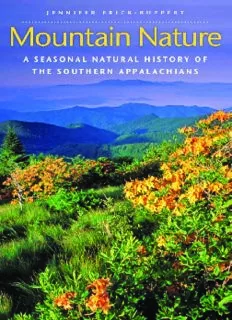
Mountain Nature: A Seasonal Natural History of the Southern Appalachians PDF
Preview Mountain Nature: A Seasonal Natural History of the Southern Appalachians
Mountain Nature Mountain Nature a seasonal natural history southern appalachians of the jennifer frick-ruppert The University of North Carolina Press Chapel Hill © 2010 The University of North Carolina Press All rights reserved Manufactured in the United States of America Set in Legacy and Stone Sans Publication of this book was supported in part by generous gifts from Frank and Doris Guest, Linda Martinson, Augustus and Margaret Napier, Aleen Steinberg, and Kenneth and Harriet Walls. The paper in this book meets the guidelines for permanence and durability of the Committee on Production Guidelines for Book Longevity of the Council on Library Resources. The University of North Carolina Press has been a member of the Green Press Initiative since 2003. Frick-Ruppert, Jennifer. Mountain nature : a seasonal natural history of the Southern Appalachians / Jennifer Frick-Ruppert. p. cm. Includes bibliographical references and index. isbn 978-0-8078-3386-5 (cloth : alk. paper) isbn 978-0-8078-7116-4 (pbk. : alk. paper) 1. Natural history—Appalachian Region, Southern. 2. Forest ecology—Appalachian Region, Southern. 3. Mountain ecology— Appalachian Region, Southern. 4. Animal ecology—Appalachian Region, Southern. I. Title. qh104.5.a6f75 2010 508.75—dc22 2009039275 cloth 14 13 12 11 10 5 4 3 2 1 paper 14 13 12 11 10 5 4 3 2 1 for Fritz This page intentionally left blank Contents acknowledgments xiii introduction: the diverse southern appalachians 1 1 the nature of cycles 9 Daily Cycles and Biological Clocks 10 The Daily Cycle of Sleep in Animals 11 Daily Cycle of Sleep in Plants? 12 Communication at Night 12 Seasonal Cycles and Biological Calendars 15 Day Length as the Cue for Seasonal Calendars 17 Tree Rings: Evidence of Seasonal Cycles in Plants 19 Migration and Hibernation: Seasonal Cycles in Animals 20 Seasonal Cycles of Aquatic Animals 21 Appalachian Trout and Other Fish 23 Trout Food: Aquatic Insects 25 Longer-term, Multi-year Cycles 26 Tree Reproduction and Long-term Masting Cycles 27 Masting in Cicadas? 28 Population Peaks in Voles as Long-term Cycles 29 Geological Features as Extremely Long-term Cycles 31 The Nature of Cycles 33 2 cycles of spring: march, april, may 35 Pollination and Flower Form 35 Pollination in Serviceberry and Silverbell 36 Wind Pollination in Maples, Oaks, and Grasses 37 Insect Pollination in Tulip Trees, Magnolias, and Flame Azaleas 40 Of Peas and Pollinators: Locusts and Other Legumes 41 Ephemeral Wildflowers: Ramps and Trout Lilies 44 Other Wildflowers: More Lilies, Trilliums, and Jack-in-the-Pulpits 47 “Leaves in Three, Let It Be!” 48 Oconee Bells: A Charismatic Appalachian Wildflower 49 Bloodroot: A Native Poppy 51 Plants and Ants: Beneficial Relationships 51 The Orchids: Wildflowers that Trick Insects and Parasitize Fungi 54 Morels: A Springtime Delicacy 56 Squawroot and Other Parasitic Plants 57 Honeybee Swarms: Colony Reproduction 59 Insects and Migratory Birds 61 Warbler Diversity and Decline 62 Caterpillars and Cuckoos 63 Blue Birds and Bluebirds 65 Migrations: The Return Route of Hummingbirds 66 Spring Peepers 68 Climatic Conditions in Spring 69 3 cycles of summer: june, july, august 71 Flowers in Myriad Forms: Jewelweed and Dodder 71 Summer’s Divine Robes: Cardinal Flower 74 Ginseng and Yellowroot: Uncommon and Common Medicinal Plants 75 Insectivorous Plants: Sundews and Pitchers 76 The Heaths: Mountain Laurel, Rhododendron, Sourwood, and Pinesap 78 Interdependence of Plants and Pollinators: Yucca 81 What Good Is a Mosquito? 82 Seeds and Fruits: Doll’s Eyes and Hearts-a-Bustin’ 83 Rain, Fungi, and Connections 84 Dangerous Social Insects and Their Mimics 87 “Unsocial” Wasps? 91 Poisonous Butterflies and Their Mimics 93 Moth Communication and Camouflage 96 Luna Moths: Endangered or Not? 98 Katydids and Crickets: Summer Songsters Use Sound to Communicate 99 Damsels and Dragons 101 Crab Spiders: Camouflage by the Predators 103 Flashing Fireflies of Summer Evenings 103 Railroad Worms and Millipedes: Predators and Prey 106 Grouse Threat Display: Prey or Predator? 108 Southern Appalachians: Greatest Salamander Diversity in the World 109 Lizards and Snakes: Close Cousins 111 viii contents Snake Sense 114 The Centenarian Turtles 117 Climatic Conditions in Summer 119 4 cycles of fall: september, october, november 121 Bioluminescent Mushrooms 122 Leaf Color Change 123 Fall Flowers: Gentians and Orchids 126 Witch Hazel’s Bewitching Flowers 126 Dispersal of Offspring in Plants 128 Sweet Fleshy Fruits 130 Fatty Fruits? Spicebush and Dogwood 131 Other Fleshy Fruits: Sumac 133 Migrant and Resident Birds as Fruit Dispersers 134 Dry Fruits: Oaks, Hickories, and Chestnuts 135 Squirrels as Seed Dispersers 137 Bird Migration: Kinglets and Nightjars 138 Hawks: Migrants and Residents 140 Resident Screech and Barred Owls 143 Bats 144 Bats and Gargoyles 147 Migrating Monarchs and the Foods that Support Them 148 Ladybugs: Friends or Foes? 152 The Rise and Fall of Insect Populations: Woolly Bear Caterpillars 154 Woolly Alder Aphids 155 Spiders and Their Insect Prey 157 Climatic Conditions in Fall 161 5 cycles of winter: december, january, february 163 Freeze/Thaw Cycles and the Magic of Ice 163 Deciduous versus Evergreen Trees 164 Appalachian Conifers 167 The “Perfect Storm” of Acids, Adelgids, and Global Warming 168 American Holly: A Broad-Leaved Evergreen Tree 170 Rhododendrons as Evergreen Thermometers 171 Evergreen Herbaceous Plants: Cycles Reversed 172 Primitive Plants and Their Reproductive Cycles 173 Lichens and Jelly Fungi 176 Springtails: Enigmatic Winter Animals 178 contents ix
Description: